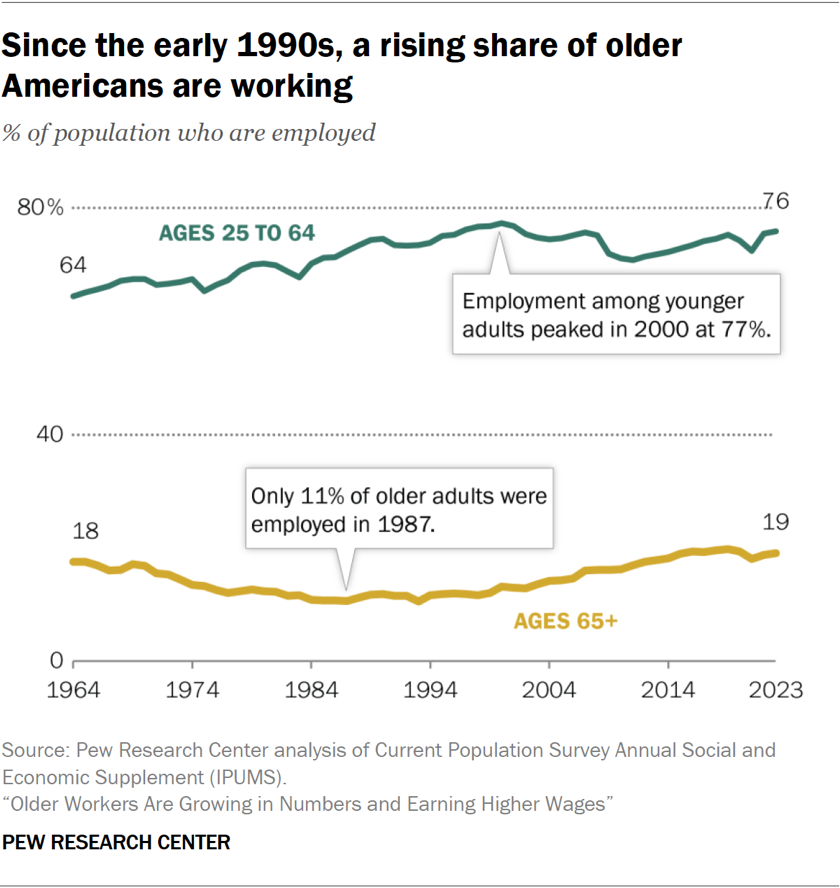The workplace is undergoing a significant transformation. People are living and working longer, while digital natives are rising to leadership roles at younger ages. It's a clash of generations, but it's also an opportunity to embrace the power of age diversity.
For too long, we've been obsessed with "knowledge work," a concept that is becoming increasingly outdated. With AI taking over many knowledge-based tasks, it's time to shift our focus to "wisdom work" - the ability to metabolize experience and share it with others.
The Age of Wisdom

The workplace is a stage for a fascinating play of contrasts. On one hand, we have a growing population of older workers, rich in experience and life lessons. On the other hand, we have a generation of digital natives ascending the leadership ladder at an unprecedented pace. It's a paradox that could create conflict, but instead, it offers a golden opportunity.
The traditional notion of "knowledge work," championed by Peter Drucker, has dominated for decades. It placed a premium on accumulating and applying knowledge. However, the digital revolution has democratized knowledge. Information is at our fingertips, and AI is rapidly mastering many knowledge-based tasks. This shift challenges the old paradigm and calls for a new approach.
Enter the age of "wisdom work." Wisdom isn't simply about knowing a lot; it's about applying knowledge with insight, judgment, and compassion. It's about seeing the bigger picture, understanding nuances, and anticipating consequences. And it's a skill honed through years of experience, navigating life's ups and downs.
Neuroscience backs this up. Research suggests that our brains continue to develop well into our 60s and 70s. The prefrontal cortex, responsible for decision-making, complex problem-solving, and emotional regulation, continues to mature, leading to greater wisdom and emotional intelligence.
In essence, older workers are like fine wine – they get better with age. They bring a depth of understanding and a nuanced perspective that can't be replicated by AI or simply acquired through formal learning.
In a world that's becoming increasingly complex and unpredictable, wisdom is the compass that can guide us through uncertain times. It's time to embrace the modern elder, recognize their invaluable contributions, and foster a workplace where wisdom and experience are celebrated.
The Perks of a Wisdom-Powered Workplace
Embracing "wisdom work" can lead to several benefits:
- Happier, More Loyal Employees: When older workers feel valued and their wisdom is appreciated, they're more likely to stay with a company. Similarly, younger employees who have access to mentors and coaches are more engaged and less likely to burn out.
- Dream Teams: Diverse teams, with a mix of ages and experiences, outperform those with a single generation. It's the perfect blend of youthful energy and seasoned perspective.
- People-First Culture: Understanding the needs and motivations of employees across generations fosters a more inclusive and supportive work environment.
- Unlocking Hidden Potential: Tapping into the wisdom of experienced employees can elevate the entire organization and attract top talent.
Practical Tools for Your Workplace
Transforming your workplace into a wisdom powerhouse requires more than just recognizing its value. It's about actively creating an environment where wisdom can flourish and be shared across generations. Here are some actionable steps to foster a culture of intergenerational exchange:
- Storytelling Circles: Organize regular gatherings where employees of all ages can share their experiences and the lessons they've learned. This creates a safe space for vulnerability and connection, fostering empathy and understanding.
- "Wisdom Wednesdays": Dedicate a specific time each week for employees to connect with someone from a different generation. It could be a virtual coffee chat, a walk-and-talk, or a simple exchange of emails. This encourages cross-generational mentorship and builds relationships.
- "Reverse Mentoring 2.0": Take reverse mentoring to the next level by pairing younger employees with older colleagues to teach them new skills or technologies. This empowers both parties and creates a sense of mutual respect and collaboration.
- "Wisdom Jams": Bring together diverse groups of employees to brainstorm solutions to complex problems. The blend of youthful creativity and seasoned experience can lead to innovative breakthroughs.
- "Legacy Projects": Encourage older employees nearing retirement to document their knowledge and expertise. This could be in the form of written guides, video tutorials, or mentorship programs, ensuring their wisdom is preserved and passed on.
- "Wisdom Circles": Create small groups where employees can discuss ethical dilemmas or complex situations. This encourages critical thinking and the application of wisdom to real-world challenges.
- "Celebrate Experience": Recognize and celebrate the contributions of older employees. This could be through awards, public acknowledgements, or simply creating a culture where experience is valued and respected.
Remember, cultivating wisdom isn't just about knowledge transfer; it's about creating an environment where everyone feels comfortable sharing their experiences and insights. By fostering intergenerational connections and celebrating the value of wisdom, organizations can tap into the full potential of their workforce and achieve lasting success.
The Future of Work
In an era of rapid technological advancements, human wisdom is our unique advantage. It's time to shift our focus from knowledge accumulation to wisdom cultivation. By creating a workplace that values experience and encourages intergenerational collaboration, we can unlock the full potential of our workforce and achieve greater success.
Remember, wisdom isn't just about age; it's about the ability to learn from experiences and share those insights with others. Let's create a workplace where wisdom is celebrated, and everyone has the opportunity to contribute their unique perspective.








.jpeg)







